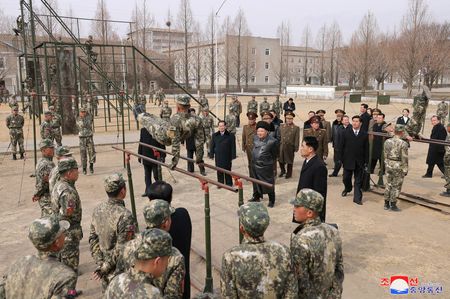By Josh Smith
SEOUL (Reuters) -Lee Jae-myung, the liberal South Korean politician favoured to become the country’s next leader, has overcome a knife attack, martial law and criminal charges on his unexpected path back toward the presidency.
Named the Democratic Party’s candidate on Sunday, Lee leads potential conservative opponents by double digits in most polls ahead of the June 3 snap election called after Yoon Suk Yeol was removed from office over his brief attempt at martial law in December.
Lee’s unlikely journey from child labourer to human rights lawyer to governor known for his COVID-19 response reached the top level when he narrowly lost the presidency to Yoon, who later accused Lee of obstruction in justifying the martial law decree that led to Yoon’s ouster.
If elected, Lee, 61, called a “gladiator in a suit” by one adviser, would face the task of soothing polarised politics and addressing rising economic concerns while negotiating with U.S. President Donald Trump’s administration on everything from tariffs to the cost of hosting American troops in the country.
On foreign policy, Lee is seen as likely to be less hawkish than Yoon on North Korea, potentially aligning him with any efforts by Trump to reach out to the country’s leader, Kim Jong Un.
Legal accusations, although rejected by some courts, could threaten Lee’s eligibility for president. Yet he is poised to win after leading the effort to impeach Yoon in a rollercoaster political crisis.
During Yoon’s six hours of martial law on December 3, Lee climbed the National Assembly’s walls to avoid security cordons deployed on Yoon’s orders. He livestreamed his exploit, urging viewers to come to parliament and demonstrate to prevent the arrest of lawmakers.
Shortly after, he told Reuters the crisis was like a “virus” that had infiltrated the South Korean system, and that he was dedicated to eradicating it.
“We have to focus on removing the virus,” he said. “With proper, rapid treatment, we will recover, and through the process, our nation and democracy will become even stronger.”
ROUGH START
Born to an impoverished farming family in a remote mountain village in the country’s southeast, Lee worked as a child in chemical factories. He says the experience, which left him with impaired hearing and a wrist deformity, explains his focus on economic equality.
As a human rights and labour lawyer, he entered politics, becoming mayor of Seongnam, south of Seoul, in 2010. Aiming for higher office, he came in third in the 2017 DP presidential primary after the impeachment and removal of conservative Park Geun-hye. The next year Lee was elected governor of Gyeonggi-do, South Korea’s most populous province.
During the 2022 presidential campaign, his outsider image was initially considered a liability against establishment competitors. But with many disillusioned by runaway housing prices, poor employment prospects and a string of corruption scandals, Lee’s populist message drove him to the head of the DP pack.
When Yoon squeaked out South Korea’s narrowest presidential victory ever, Lee became the new president’s main opponent as DP leader in parliament.
In a rare step, Yoon refused to meet Lee and later cited unprecedented obstruction by parliament as a justification for martial law, an argument rejected by the Constitutional Court that removed him.
In January 2024, Lee was stabbed in the neck by a man who had written a manifesto saying he wanted to ensure Lee never became president. The assailant is serving a 15-year sentence for attempted murder.
POSITIONS, SCANDALS
On policies, Lee has tempered some of his messages ahead of this election.
Previously arguing for a balanced approach between China and the United States, he now focuses on praising South Korea’s alliance with Washington.
His zeal for proposals like a universal basic income has faded in favour of issues more popular with businesses, including flexibility on working-hour restrictions, reforming inheritance taxes, and credits to companies that keep production in South Korea.
Lee faces his share of scandals and legal entanglements.
He was convicted in November of violating the election law, getting a sentence that could have disqualified him from the presidency. An appeals court overturned the conviction last month and his case is now before the Supreme Court. The timing and outcome of its ruling could affect his eligibility.
Lee was cleared in November of a charge of having forced a witness to commit perjury. Prosecutors have appealed that ruling.
His other trials include one involving a $1-billion property development scandal and another linked to an alleged scheme to use an underwear company to transfer funds to North Korea and facilitate a visit to Pyongyang when he was a provincial governor.
He has denied all the charges.
(Reporting by Josh Smith; Editing by William Mallard)










